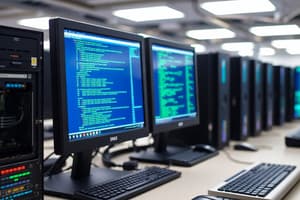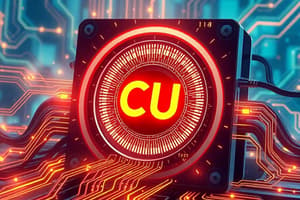Podcast
Questions and Answers
What are the two main categories of computer components?
What are the two main categories of computer components?
The two main categories of computer components are hardware and software.
What does the term 'compute' refer to in relation to computers?
What does the term 'compute' refer to in relation to computers?
'Compute' refers to the calculation process performed by computers.
What role do translators play in the use of high-level programming languages?
What role do translators play in the use of high-level programming languages?
Translators convert high-level language commands into binary language.
How has the evolution of computers affected the speed and accuracy of calculations?
How has the evolution of computers affected the speed and accuracy of calculations?
Which early calculating device is mentioned as the starting point of computer evolution?
Which early calculating device is mentioned as the starting point of computer evolution?
What are some examples of high-level programming languages?
What are some examples of high-level programming languages?
What distinguishes hardware from software in a computer system?
What distinguishes hardware from software in a computer system?
Why has the use of electronic devices increased significantly in modern life?
Why has the use of electronic devices increased significantly in modern life?
What are the two main components of a computer's function as defined by input and output?
What are the two main components of a computer's function as defined by input and output?
Explain the concept of GIGO in relation to computer accuracy.
Explain the concept of GIGO in relation to computer accuracy.
How does a computer's speed compare to human processing capabilities?
How does a computer's speed compare to human processing capabilities?
What does versatility mean in the context of computer capabilities?
What does versatility mean in the context of computer capabilities?
Describe the importance of memory in a computer.
Describe the importance of memory in a computer.
What characteristic allows computers to perform repetitive tasks without fatigue?
What characteristic allows computers to perform repetitive tasks without fatigue?
How does a computer's storage capacity surpass that of human memory?
How does a computer's storage capacity surpass that of human memory?
What is a notable drawback of computers despite their advanced characteristics?
What is a notable drawback of computers despite their advanced characteristics?
Flashcards are hidden until you start studying
Study Notes
Introduction to Computers
- Computers are ubiquitous, used in diverse electronics from televisions to mobile phones.
- Increased use driven by convenience and speed.
- Computers process input data according to instructions, producing output.
- Operate using electronic signals representing binary code (0 and 1).
- Early programming used binary language; now, high-level languages (C, C++, Java, Python, etc.) are used, requiring translation to binary.
- Computer systems comprise hardware (tangible components like keyboard, mouse) and software (intangible instructions like operating systems).
- Input refers to user-provided data/instructions; output is the processed result.
Characteristics of Computers
- Speed: Process data and instructions rapidly (3-4 MIPS). Note that this differs from communication speed (baud).
- Versatility: Handle various tasks easily, switching between different applications (word processing, calculations).
- Accuracy: Achieve high precision in calculations. Errors typically result from incorrect input data or instructions (GIGO: Garbage In, Garbage Out).
- Diligence: Perform repetitive tasks tirelessly and accurately without fatigue.
- Memory: Possess main memory (volatile, lost upon power off) and secondary memory (non-volatile, e.g., hard drives, pen drives) for persistent storage.
- Storage: Can store large amounts of data for retrieval, unlike limited and fading human memory.
- Intelligence: Initially limited, lacking the decision-making capabilities of human intelligence. Early computers were considered "dumb machines."
Evolution of Computers
- Developed to address the slowness and error-proneness of manual calculations.
- Evolved from the abacus to high-speed computing devices.
- "Computer" derives from "compute," reflecting its primary function of calculation.
Studying That Suits You
Use AI to generate personalized quizzes and flashcards to suit your learning preferences.



